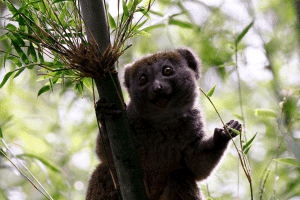Red-bellied Lemurs
One of the rarest members of its family
Number left in the wild
20000
% of Madagascan forest lost
90%
Population loss in 3 generations
30%
From Red-bellied lemurs’ name, you’d think they all have red bellies, right? Wrong! Only males of the species have red bellies, and females have white ones – so they’re very easy to tell apart.
Red-bellied lemurs have a very cute family dynamic. A male, a female, and all of their children live together and are very close. They eat, sleep, and travel together.
The Red-bellied lemur is the rarest species of its genus “Eulmur”, and there aren’t that many in zoos and wildlife parks. This means it’s all the more important to keep them safe.
Like Greater bamboo lemurs, Red-bellied lemurs are threatened by habitat loss because of human activity. We are currently working on a project with the organisation, Helpsimus to help protect them and work with community education and initiatives to encourage local people to look after them.
Red-bellied lemurs have a very cute family dynamic. A male, a female, and all of their children live together and are very close. They eat, sleep, and travel together.
The Red-bellied lemur is the rarest species of its genus “Eulmur”, and there aren’t that many in zoos and wildlife parks. This means it’s all the more important to keep them safe.
Like Greater bamboo lemurs, Red-bellied lemurs are threatened by habitat loss because of human activity. We are currently working on a project with the organisation, Helpsimus to help protect them and work with community education and initiatives to encourage local people to look after them.

Threats
Habitat loss:
Red-bellied lemurs are loosing their rainforest habitat to slash-and-burn agriculture, logging and mining.Hunting:
Red-bellied lemurs are hunted heavily in some areas.Working with
Red-bellied Lemurs
Helping lemurs with Helpsimus
We work with French charity Helpsimus, funding a project to protect Greater bamboo Lemurs and Red-bellied Lemurs in the Madagascan rainforest. This project has two aims: to study lemurs, to find out how we can help them and look after their habitat, and to educate communities nearby to where they live, so local populations can help look after them.
We work with French charity Helpsimus, funding a project to protect Greater bamboo Lemurs and Red-bellied Lemurs in the Madagascan rainforest. This project has two aims: to study lemurs, to find out how we can help them and look after their habitat, and to educate communities nearby to where they live, so local populations can help look after them.
Facts
Red-bellied lemurs are what is known as a ‘cathemeral’ species, as they’re awake during the night and the day.
They are very fluffy and have teeth on their bottom jaw that are shaped like a comb, to help them groom their long fur.
Red-bellied lemurs can eat a kind of toxic millipede which they neutralise by spitting on them!
They are very fluffy and have teeth on their bottom jaw that are shaped like a comb, to help them groom their long fur.
Red-bellied lemurs can eat a kind of toxic millipede which they neutralise by spitting on them!
Seven Worlds, One Planet
We work with Helpsimus in Madagascar, the big island off the east coast of Africa.









